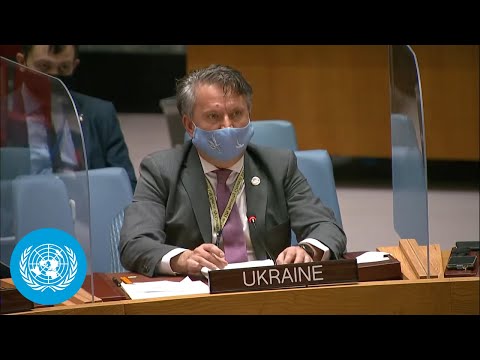The seemingly unbridgeable gap between the major powers was on full display at the Security Council as they sparred over Ukraine and Russia's security concerns, reports Joe Lauria.
By Joe LAURIA
Tensions in U.S.-Russia relations soared yet higher on Monday as the two powers voiced polar opposite positions on events surrounding Ukraine and European security at the U.N. Security Council.
The U.S. and its allies on the council painted a stark picture of an outlaw Russia threatening to invade Ukraine, while Russia sought to zoom out to the larger picture of Western threats to Russia's security.
Russia attempted to have the "provocative proposal" by the U.S. to hold the meeting stopped by calling for a procedural vote on the agenda, arguing that Washington was engaging in "megaphone diplomacy" and wanted to "whip up" the same "hysteria" about "so-called Russian aggression" in the Security Council that it had been whipping up through the media.
Russian Ambassador Vassily Nebenzia pointed out that even Ukraine's president had asked the U.S. not to stir up panic. "Ukraine talked of the lack of a threat from Russia," Nebenzia said. "We should not use the rostrum of the Security Council to push forward the propaganda of our colleague," meaning the American ambassador.
U.S. Ambassador Linda Thomas-Greenfield answered Nebenzia by saying the meeting was "not about antics and not about rhetoric," and also "not about the U.S. and Russia, but peace and security about one of our member states." She said the U.S. had spent $5 billion since 2014 so that Ukraine would be "prepared" for a Russian invasion.
Russia lost the vote to stop the meeting from going ahead.
The US Speaks
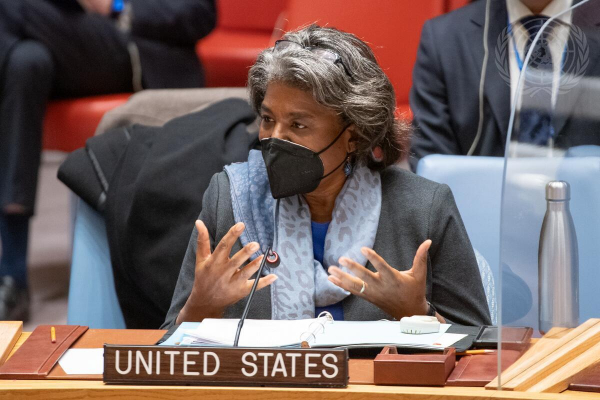
Thomas-Greenfield at Security Council debate on Ukraine Monday. (UN Photo/Eskinder Debebe)
Thomas-Greenfield told the council that "Russia's actions strike at the very heart of the U.N. Charter. This is as clear and consequential a threat to peace and security as anyone can imagine." She said, "Russia's aggression today not only threatens Ukraine. It also threatens Europe. It threatens the international order."
The U.S. ambassador said if the Security Council "stands for anything, [it] stands for the principle that one country cannot simply redraw another country's borders by force, or make another country's people live under a government they did not choose."
As any student of recent history or any astute newspaper reader understands, the United States, with its long history of coups, including by military invasions and occupations, has made many "country's people live under a government they did not choose."
Thomas-Greenfield portrayed Russia's proposed treaties with the U.S. and NATO to create a new "security architecture" for Europe as being "extensive new demands and aggressive rhetoric" paired with "Russia's military buildup."
"Russia has threatened to take military action should its demands not be met," she said, though Russia has said nothing of the kind. Moscow declared that should its treaty proposals be rejected, and so far they have, it would have no choice but to answer with "appropriate military-technical reciprocal measures."
These have been falsely portrayed by U.S. officials as an invasion of Ukraine, but could instead be deployments of new missiles in Europe, or even in Venezuela or Cuba, which could reach the U.S. the way U.S. missiles can now reach Russia from Europe (with greater speed than an ICBM from the U.S.)
Russia has not engaged in the kind of rhetoric about Ukraine that the U.S. did, for instance, in the lead up to the invasions of Iraq in 1991 and 2003 in which Baghdad was threatened on a daily basis by U.S. leaders.
"This is an escalation in a pattern of aggression that we've seen from Russia again and again," Thomas-Greenfield said. "In 2014, Russia illegally invaded and seized Crimea." This is a statement widely believed, but it ignores that Russian troops never invaded Crimea from Russia, it had troops legally stationed at its base there; not one shot was fired; and the Crimean people voted in a referendum to rejoin Russia.
Thomas-Greenfield then accused Russia of shunning diplomacy, when it was Russia who asked for diplomatic meetings with the U.S. in Geneva and NATO in Brussels. "Russia could, of course, choose a different path: the path of diplomacy," she said. "In recent weeks, the United States, along with our European allies and partners, and other nations around the globe concerned by Russia's threat to Ukraine, have continued to do everything we can to resolve this crisis peacefully," as Washington and its loyal media beat the drums of war.
Projecting its own propaganda onto Russia, the U.S. representative said: "Russian military and intelligence services are spreading disinformation through state-owned media and proxy sites. And they are attempting, without any factual basis, to paint Ukraine and Western countries as the aggressors to fabricate a pretext for attack."
Russia Answers
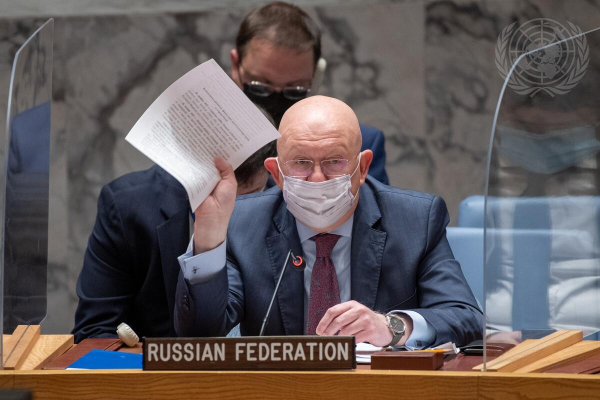
Nebenzia at Security Council on Monday. (UN Photo/Eskinder Debebe)
Nebenzia responded by saying that Russia is witness to a "very unusual situation" even in "these crazy times."
"Relocation of troops within our own national territory, which happened many times before on a larger or smaller scale and was never regarded hysterically," he said, "as well as the relocation of military personnel... stationed in their garrisons rather than at the Ukrainian-Russian border, is considered by our American and Western colleagues as a confirmation of [an] allegedly planned military campaign... of Russia against Ukraine that is about to start in the next couple of weeks if not days."
Nebenzia added: "At the same time, they provide no proof to back such grave allegations." The U.S. has released satellite photographs of Russian military installations on Russian soil, with no indication of how close to Ukraine they are. Ukrainian President Volodymyr Zelensky told the press on Friday that Ukrainian intelligence interpreted the satellite images differently than the U.S. and saw no readiness for invasion.
Nebenzia said: "Our Western colleagues say that de-escalation is needed, but they are the first to build up tension, enhance rhetoric and escalate the situation. Talks about an imminent war are provocative per se. It might seem you call for it, want it and wait for it to come, as if you wanted your allegations to come true."
He refuted Thomas-Greenfield's assertion that Russia has threatened an invasion. "No Russian politician or public figure has uttered any threat about a planned invasion of Ukraine," Nebenzia said. And then the Russian ambassador pointed out what no one else in the chamber would, least of all Thomas-Greenfield.
"Had it not been for our Western colleagues who provoked and supported a deadly unconstitutional coup in Ukraine in 2014 that gave power to nationalists, radicals, Russophobes and Nazis, Russia and Ukraine would have lived as good neighbors engaged in mutually beneficial cooperation up until this day," he said.
"Someone in the West, however, seems to hate such a scenario. What happens today is another attempt to drive a wedge between Russia and Ukraine," Nebenzia said. He then described post-coup Ukraine:
"Ukrainians are brainwashed to cultivate Russophobic and radical sentiments. They are taught to believe that Ukraine's radiant future depends on whether it seeks EU and NATO membership rather than whether it tries to improve relations with neighbors. The Russian language, which is native to a significant (if not major) part of Ukrainians is banned, a division of church is being provoked, and those who sided with Hitler during WW2 killing Jews, Poles, Ukrainians, and Russians, are worshipped as heroes."
He said Russia's "Western colleagues" didn't care about Ukrainians but only to divide Ukraine from Russia in order to weaken Russia. The U.S. had falsely linked cries about a Russian invasion to Russia's treaty proposals to the U.S. and NATO, he said.
"As for our security-related demands, they are much broader," Nebenzia went on. "Ukraine's non-accession to NATO and non-deployment of foreign troops at Ukraine's territory constitute only a small portion of much-needed arrangements that could considerably improve the military and political situation in Europe, and in the whole world."
Turning the tables on the U.S., the Russian ambassador asked the council which country was the real threat to international peace and security:
"The maneuvers that the United States undertook to convene this meeting look especially inadequate and hypocritical against the fact that it is Americans who have record rates of military presence outside their national territory. American military officers, advisers, and weapons (including nuclear) are often located thousands of kilometers away from Washington. To say nothing of the fact that American military [ad]ventures claimed dozens and hundreds [of thousands] of lives of people in the countries to which they were bringing peace and democracy.The United States repeatedly (i.a. in the recent years) used force against other states without Security Council consent. Their toolkit includes unilateral sanctions and coercive measures, as well as threats that they regard as a verdict of some sort of Supreme Court and try to make everyone deliver on them.
As reported by American experts, 84 out of 193 UN member states have been subjected to US occupation or aggression to some degree. In the course of 20th and 21st centuries, American troops have been deployed in one way or another in 191 states.
According to open-sourced data from the Internet, the United States maintains approximately 750 military bases in more than 80 states of the world. The total number of US military servicemen abroad amounts to 175 thousand, more than 60 thousand of them are deployed in Europe. The US military budget in 2020 stood at 778 billion dollars, whereas the Russian - at only 61 billion dollars, which is 12 times less. All these examples are clear and concrete threats to the international peace and security."
In a right of reply, Thomas-Greenfield said she was "disappointed" by Nebenzia's "false equivalency" - the stock line from the Cold War, which says it is false to equate U.S. behavior with the aggression of others. "There are no plans to weaken Russia," she said. "Welcome Russia as a responsible member of the international community," which means, of course, following the Washington Consensus.
Nebenzia then replied that he had not heard one word from Thomas-Greenfield about the Minsk agreements "and that is very indicative."
Ukraine Speaks
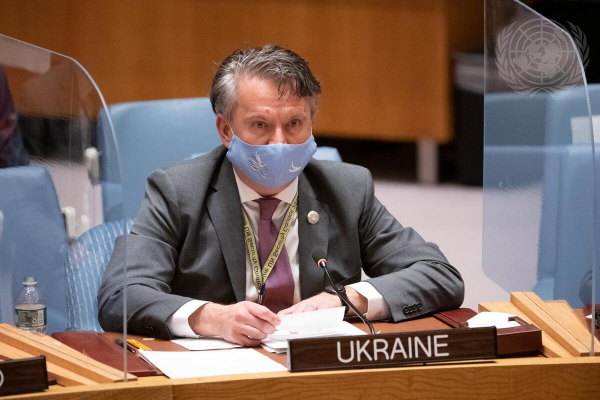
Kyslytsya at Security Council on Monday. (UN Photo/Evan Schneider)
Eyes were on Ukraine's U.N. ambassador, Sergiy Kyslytsya, in light of Zelensky and other Ukrainian officials' statements last week rebuffing America's war propaganda that a Russian invasion of their country was "imminent." Would he make similar statements in front of the U.S. ambassador on a world stage?
He would not make his remarks before Nebenzia, who moments before the Ukrainian was to speak said he had an appointment with the U.N. secretary general and left the chamber. The snub clearly ruffled Kyslytsya.
His remarks were more aggressive towards Russia than Thomas-Greenfield's with no hint of his president's position. It was as if Zelensky had not made the remarks he just had three days earlier. In fact Kyslytsya tried to say that the Russian ambassador had made it all up.
"It's important that Ukraine's voice is heard today in the Security Council and is not lost in translation when [the] position of my country has been 'delivered' by a foreign ambassador in Russian," he said. "My leadership speaks its own language, has its own ambassadors, and spokespersons. Hence there is no need to interpret the words of Ukrainian officials."
Except that is precisely what Kyslytsya did. He said nothing of what Zelenksy and other Ukrainian officials had made clear: that Ukraine has no fear of imminent invasion and that the U.S. and its allies had essentially made it all up.
Breaking with his president, Kyslytsya raised the alarm: "The fact is that nowadays about 112 thousand Russian troops have been amassed around Ukraine's borders and in Crimea, and together with the maritime and aviation components their number reaches about 130 thousand troops."
He went on:
"On 26 January, the Russian fleet started another military drill in the Black Sea with involvement of frigates, patrol ships, missile ships, assault landing ships and minesweepers. This reminds us of the ongoing heavy militarization of the temporarily occupied Crimea, the Black Sea and the Sea of Azov by Russia, which poses a serious threat to Ukraine, all littoral states and the wider region.... The question is why all these Russian forces are there?...Today we have heard from the Russian side that they do not intend to launch a war against my country, although one should rather speak about launching a new phase of the Russian aggression.
It is very important message as we still lack credible explanations by Russia of its actions and military movements. Based on experience we cannot believe Russian declarations but only practical moves on withdrawal of troops from the border."
Why did Kyslytsya totally ignore what Zelensky had said? U.N. ambassadors directly report to their foreign ministers, not their presidents. Ukrainian Foreign Minister Dmytro Kuleba is a hardliner. Last month he condemned Germany for refusing to send weapons to Ukraine. "The German partners must stop undermining unity with such words and actions and encouraging Vladimir Putin to launch a new attack on Ukraine," he tweeted.
And Kubela protested "the categorical unacceptability" of the now former chief of the German navy's remarks that the idea of a Russian invasion was "nonsense."
There may well be a power struggle going on between Kuleba and Zelensky, causing the foreign minister to go rogue. There is also the possibility that the U.S. has put enormous pressure on Zelensky to retreat from his remarks. The blogger Moon of Alabama has speculated that the Americans could soon "replace" Zelensky as president.
Thomas-Greenfield was interviewed on National Public Radio on Tuesday:
QUESTION: But I've got to ask you, you know Ukrainian President Volodymyr Zelenskyy has also complained about U.S. warnings saying it has needlessly caused a panic that puts Ukraine's economy at risk. What do you make of that?
AMBASSADOR THOMAS-GREENFIELD: Well, you know, the Permanent Representative, the Ambassador from Ukraine, was at the meeting yesterday, and he reaffirmed our concerns and Ukraine's concerns about the situation on their border. And we have met with the President, we've met with the Foreign Minister, and I think you had the foreign minister on your line this morning - QUESTION: - Mary Louise Kelly spoke with him yesterday on "All Things Considered."
AMBASSADOR THOMAS-GREENFIELD: Yes. And he said that they absolutely agree. He confirmed there were more than 100,000 troops on the border. Their messaging is different from ours, as he noted, but the goals are the same.
Video of the full council meeting.
France Wimps Out
France was in a similar position to Ukraine: its president had called last month in a speech to the European Parliament for a new security arrangement in Europe that would include Russia. That was reiterated in two phone calls Emmanuel Macron made to Vladimir Putin over the past five days. At the same time, France has agreed to send its forces to Eastern Europe in the midst of the crisis. Would French ambassador Nicolas de Rivière make reference to Macron's position? Non.
He characterized the Russian deployment inside its own territory as "threatening" and called for "the non-use or threat of use of force; and the freedom of States to choose or change their own security arrangements. They are neither negotiable nor subject to revision or reinterpretation." That is the U.S. and NATO line that rejects Russia's security demand that Ukraine not join NATO and that NATO membership near Russia be rolled back.
Rivière then said what several U.S. allies on the council repeated: "The notion of a sphere of influence has no place in the 21st century." This is a rejection of Russia's desire for a security buffer from what it sees as an aggressive West. It also flies in the face of the U.S. Monroe Doctrine, which is still alive and well in Latin America, and even of France's continual involvement, both politically and militarily, in their former African colonies.
Between NATO and Russia
Martin Kimani, Kenya's U.N. envoy, said what is clear to anyone who is not under the spell of the U.S.: that "the main issue in this crisis is between NATO and Russia."
Kimani said: "Where there are disputes we support patient diplomacy as the first, second and third options." He said "when it involves major powers there must be comprise. NATO and Russia have an opportunity to resolve their differences."
The Kenyan envoy warned about a "new age" of "containment, provocation and proxy action."
"We experienced that," he said. "The Cold War deeply damaged our Africa. When elephants fight it is the grass that suffers."
Gabon's ambassador, Michel Xavier Biang, denounced the "alarming rhetoric of war" and pointed out what the Ukrainian ambassador would not, namely that the "Ukrainian president said to refrain from whipping up panic."
Brazil's permanent representative, Ambassador Ronaldo Costa Filho, said: "Brazil... highlights the need for good-faith in order to address legitimate security concerns of all parties, including Russia's and Ukraine's."
Mexico was skeptical of Russia, saying, "It was encouraging to hear from the Russian representative that he reiterated there is no planned invasion. Well how good it would be if that is the case. But that is a unilateral declaration."
China Asks, 'What War?'
As Russia's most important ally, China's U.N. ambassador, Zhang Jun, said: "Some countries led by the U.S. have claimed that there is a looming war in Ukraine. Russia has repeatedly stated that it has no plans to launch any military action. And Ukraine has made it clear that it does not need a war. Under such circumstances, what is the basis for the countries concerned to insist that there would be a war?"
Zhang said that "at a time when dialogue and negotiations are underway, and concrete progress has yet to be made, the holding of such an open meeting by the council is clearly not conducive to creating a favorable environment for dialogue and negotiations, nor is it conducive to defusing the tensions."
Zhang also called for Russia's concerns about NATO to be respected:
"The expansion of NATO is a problem difficult to circumvent in handling the current tension. NATO is the product of the Cold War, and NATO expansion epitomizes bloc politics. We believe that the security of one country should not?be achieved at the expense of the security of other countries. Still less should regional security rely on strengthening or even expanding military blocs. Today in the 21st century, all parties should completely abandon the Cold War mentality and come up with a balanced, effective and sustainable European security mechanism through negotiations, with Russia's legitimate security concerns being taken seriously and addressed."
Britain and Norway Back US to the Max
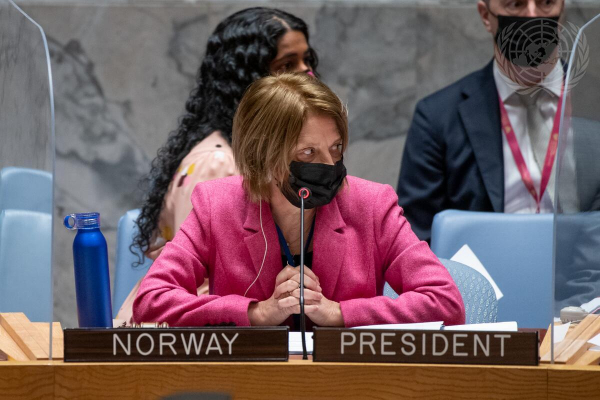
Norway's ambassador Mona Juul at the council on Monday. (UN Photo/Eskinder Debebe)
On mop up duty, NATO members Norway and Britain reinforced what the U.S. had said. Mona Juul, Norway's envoy, perhaps went even further, calling Russia's proposals on NATO "unrealistic demands that threaten European security." She said: "Russia has accused NATO of creating tensions. NATO is a defensive and voluntary organization."
It is an organization that has ventured far outside its European theater of operations to launch aggressive actions against Yugoslavia, Afghanistan and Libya, as well as conducting drills simulating attack near Russia's borders.
As America's most loyal ally, British Ambassador James Kariuki said: "In the best case scenario, the scale of the Russian forces assembled on three sides of Ukraine is deeply destabilizing. In the worst case, it is preparation for a military invasion of a sovereign country."
He said: "Russia denies that its forces are posing a threat to Ukraine. But yet again we see disinformation, cyber-attacks and destabilizing plots directed against an independent, democratic country."
The council also heard from Albania, Lithuania and Poland, whose remarks were dismissive of Russia having interests of its own in the matter.
